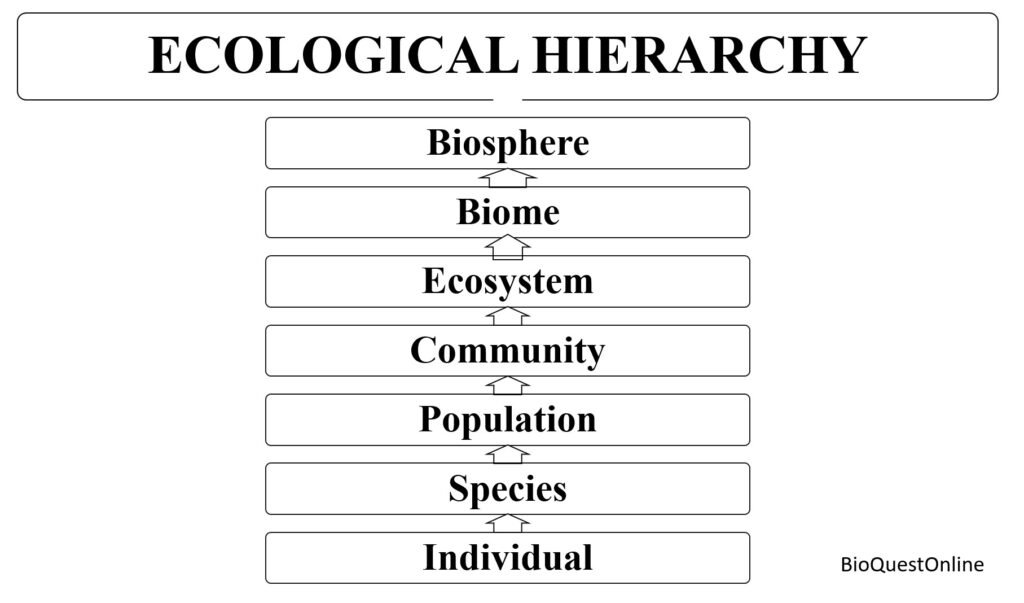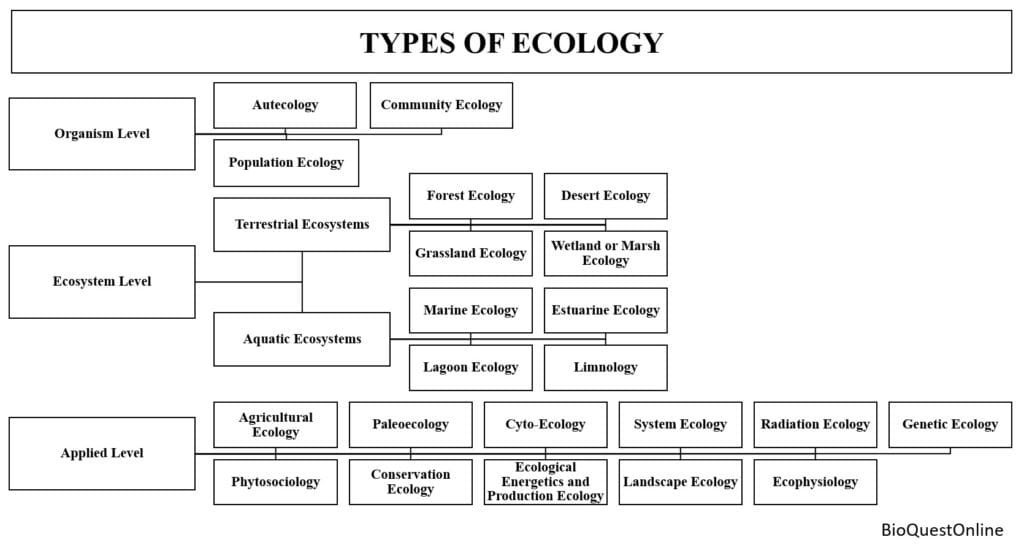Definition and Meaning
Ecology is a scientific discipline that explores the interactions between organisms, their habitats, and the living and non-living components within those habitats.
The term “ecology” was first introduced by the scientist Reiter, combining the Greek words oikos (meaning “house” or “dwelling”) and logos (meaning “study”) to describe these relationships.
While there is some debate over who originally coined the term, German zoologist Ernst Haeckel is widely credited for popularizing it in 1866 when he used the term oekologie to describe the interconnections between living organisms and their environment.
Eugene Odum, often referred to as the father of modern ecology, described it in 1963 as the study of the structure and function of ecosystem. Similarly, Lewis and Taylor (1967) characterized it as “the study of how individual organisms, populations, and communities respond to environmental changes.”
Smith (1977) describes it as “a multidisciplinary science that addresses organisms and their habitats, focusing on ecosystems.” Simply put, ecology is a branch of biology that scientifically examines the interactions between organisms and their environment, which consists of both biotic (living) and abiotic (non-living) components.
These interactions create a dynamic relationship, where changes in the environment affect organisms, and organisms, in turn, influence their environment.
The primary goal of ecology is to understand the distribution and relationships of biotic and abiotic factors in the environment. As a broad and comprehensive field, it is studied at various levels, including the biosphere, ecosystems, communities, populations, and individual organisms. It encompasses all forms of biodiversity.
Ecology is closely linked to other biological disciplines such as physiology, genetics, evolution, and behavior. For instance, analyzing the food chain in a wetland is an example of ecological study.
Ecological Hierarchy
Ecological hierarchy refers to the arrangement of ecological components in a hierarchical order. Each species that exists in the world contributes to the makeup of ecology. The fundamental building block of an ecological system is the individual organism. The various levels of ecological hierarchy are outlined below:

- Biosphere: The highest level of ecological organization, encompassing all living organisms and their interactions with the physical environment on a global scale.
- Biome: A large-scale geographic region characterized by distinct climate, vegetation, and animal communities.
- Ecosystem: A specific area where living organisms (biotic components) interact with the physical environment (abiotic components), including factors like climate, soil, water, and nutrients.
- Community: All the populations of different species living and interacting within a defined ecosystem.
- Population: A group of individuals of the same species living within a specific area and capable of interbreeding.
- Species: A species is a group of organisms capable of interbreeding and producing fertile offspring. It represents the fundamental level of classification in taxonomy, the scientific system used to categorize organisms based on their biological traits.
- Individual: The smallest unit of ecological organization, referring to a single organism of a particular species.
Types of Ecology
The levels of ecological study provide unique perspectives on the interactions between organisms and their environment. Ecology is broadly categorized into two main branches:
- Autecology: This branch focuses on the ecology of an individual species or its population, examining how environmental factors and interactions with other organisms influence its life cycle. In essence, it studies the relationship between a specific species or population and its environment.
- Synecology: This area explores the relationships between groups of organisms and their shared environment. It examines plant communities, their composition, behaviors, and interactions with their surroundings.
Autecology is crucial for understanding how a particular organism interacts with its environment, while synecology provides insights into how entire communities relate to their environment. For instance, studying how a specific tree interacts with its environment falls under autecology, whereas investigating the impact of a forest on its environment is considered synecology.
Herreid II (1977) described the relationship between autecology and synecology by stating that “the two types of study are interconnected, with the synecologist creating the broad outline of the picture, while the autecologist adds the finer details.”
Ecological studies focus either on organisms or their habitats and are carried out at various levels. The primary branches are autecology and synecology. In addition to these core subdivisions, several specialized branches have been developed to address specific and detailed aspects of ecological study. These specialized fields include:

Organism Level
Organism Level of ecology focuses on the adaptations that enable individual organisms to survive and thrive in specific habitats. These adaptations may be morphological, physiological, or behavioral.
- Autecology: Also known as species ecology, this branch studies the interactions between an individual organism or a single species and the biotic (living) and abiotic (non-living) factors in its environment.
- Population Ecology: This field studies about the processes influencing the distribution and abundance of plant and animal populations.
- Community Ecology: This branch focuses on the structure and functioning of communities, which are groups of interacting populations of different species within a specific area or habitat.
Ecosystem Level
Terrestrial Ecosystems
- Forest Ecology: The study of ecological aspects patterns, processes, flora, and fauna within foreste areas.
- Grassland Ecology: The study of ecological aspects of grasslands, which are areas dominated by grasses, often accompanied by non-woody plants and, in the case of savannahs, scattered trees.
- Desert Ecology: The study of interactions between biotic (living) and abiotic (non-living) components in desert environments.
- Wetland or Marsh Ecology: Focuses on low-lying areas saturated with water either permanently or seasonally, characterized by hydric soils and aquatic vegetation. Typical examples of wetlands include marshes, swamps, and bogs.
Aquatic Ecosystems
- Marine Ecology: The scientific study of marine life and its interactions with the surrounding ocean environment.
- Lagoon Ecology: The study of shallow water bodies, such as lagoons, which are separated from larger bodies of water or the ocean by reefs or other barriers. An example of a lagoon is an inlet off the Pacific Ocean separated by a coral reef.
- Estuarine Ecology: The study of semi-enclosed coastal areas that are connected to the open sea and influenced by tidal movements, where seawater mixes with freshwater from land drainage. Examples of estuaries include coastal bays, tidal marshes, and river mouths.
- Freshwater Ecology or Limnology: Limnology focuses on the study of inland waters, including both lotic systems (moving water like rivers and streams) and lentic systems (still water like lakes and ponds).
Applied Level
Applied ecology involves a comprehensive approach to the ecological, social, and biotechnological aspects of managing and conserving natural resources. It encompasses the following:
- Agricultural Ecology: This field focuses on the study of agricultural ecosystems and how their components function both internally and within the broader landscape.
- Phytosociology: A branch of plant ecology that examines the composition, distribution, characteristics, and relationships among plant species within plant communities.
- Paleoecology: The study of how organisms interacted with their environment and functioned within physical and biological processes during the geologic past.
- Conservation Ecology: This area applies ecological principles to the sustainable management of natural resources, aiming to maximize the yield of useful biological materials for human benefit.
- Cytoecology: The study of cytological characteristics in a species in relation to its population across varying environmental conditions.
- Ecological Energetics and Production Ecology: These fields focus on energy conversion mechanisms, energy flow through organisms, and the rates of organic production in both plants and animals over space and time.
- System Ecology: This branch examines the structure and functioning of ecosystems using applied mathematics, models, and computer programs. It emphasizes input-output analysis and has contributed to applied ecology in resource management, agricultural production, and environmental pollution.
- Landscape Ecology: The study of the relationship between ecological processes and specific ecosystems at various spatial and organizational scales, aiming to improve the management of landscapes through policy and development patterns.
- Radiation Ecology: This field investigates the effects of radioactive materials on living systems, focusing on two main aspects: the impact of radiation on individuals, populations, and ecosystems, and the fate of radioactive substances in the environment.
- Ecophysiology: The study of how both physical and biological environmental factors influence the physiology of organisms. It explores the effects of climate and nutrients on physiological processes in plants and animals, especially in relation to organism size.
- Genetic Ecology: Genetic ecology examines the stability and expression of genetic material in relation to abiotic factors. It focuses on the interactions, exchange, and expression of genetic material that may not be present in species outside of the same environment.
Importance of Ecology
The study of ecological principles helps in understanding the fundamental relationships within natural communities, as well as the specific environments like soil, oceans, forests, and inland waters.
This field has many practical applications in areas such as forestry, agriculture, horticulture, fisheries, and biology. Plant ecology, in particular, focuses on the scientific study of plant-environment relationships and describes the life of plants in their natural habitats.
It highlights the physiological connections between plants and their environmental conditions. Ecological principles form the foundation of practices in agriculture and forestry.
Ecology is vital for human well-being and prosperity, offering insights into the interdependence between organisms and their environment. This knowledge is essential for food production, managing resources like land and water, and preserving biodiversity amid a changing climate. Ecology is also fundamental to nature conservation.
The following points illustrate the importance of ecology.
- Helps in Environmental Conservation: The study of ecology helps us understand the negative effects of human actions on the environment. By identifying the main causes of environmental problems, we can better direct conservation efforts. This process ensures that our actions have the most significant impact. Environmental conservation involves protecting the planet, preserving its natural resources, and improving the quality of life for all living organisms.
- Proper Resource Allocation: Resource allocation refers to the planning, managing, and distribution of resources based on ecological knowledge. Understanding the resources needed for the survival of different organisms allows for informed decisions. Ecology forms the foundation for developing effective conservation policies, particularly when those managing natural resources are well-versed in areas like forestry, wildlife, agriculture, land management, and fisheries.
- Enhances Energy Conservation: Energy conservation involves reducing energy consumption by modifying human behaviors and habits. All living organisms require energy for growth and development. A lack of ecological understanding can lead to the overuse of energy resources, such as food, light, and radiation, causing depletion. Knowledge of ecological needs helps minimize waste and ensures energy is available for future use.
- Promotes Eco-Friendliness: Eco-friendliness refers to products and practices that support green living, conserve resources like energy, and reduce pollution (air, water, and noise). Ecology encourages a lifestyle that fosters harmony among species and promotes protecting the environment.
- Assists in Managing Diseases and Pests: Pests and diseases are natural components of ecosystems. Many diseases are transmitted by vectors. Ecological research helps us understand how these vectors and pests behave and equips us with the knowledge and tools to manage them effectively.


